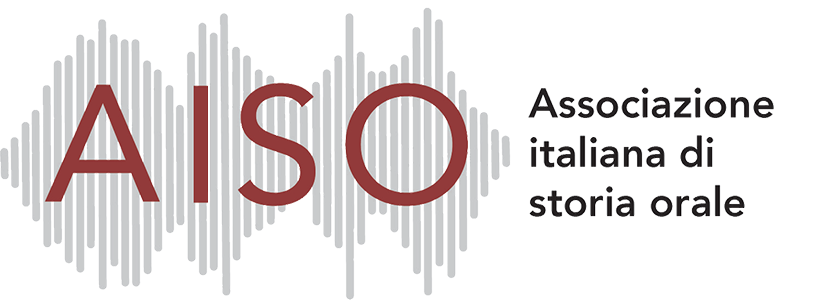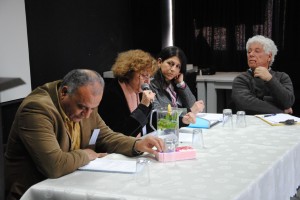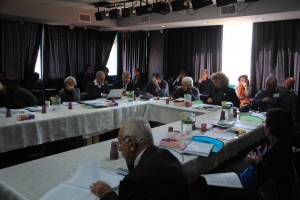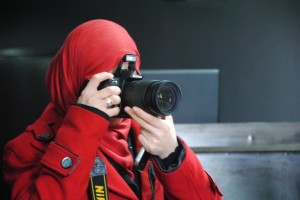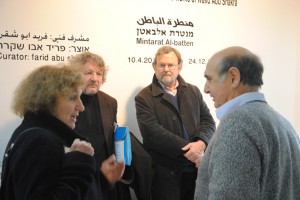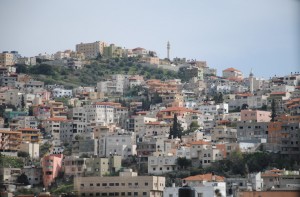
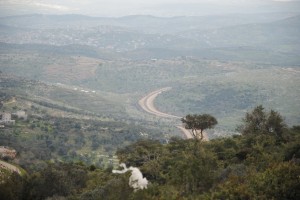 Seminario su Oral History, Memory and Art (Umm el-Fahem, Israele, 20-23 febbraio 2012)
Seminario su Oral History, Memory and Art (Umm el-Fahem, Israele, 20-23 febbraio 2012)
A Umm el-Fahem, una cittadina araba in Israele (ai suoi confini il muro che la divide dalla Cisgiordania) si è svolto il seminario su Oral History, Memory and Art (20-23 febbraio 2012), organizzato dall’AISO e dalla Umm el-Fahem Art Gallery. Fondata da Said Abu Shakra, l’Art Gallery è un centro che, oltre a raccogliere e mostrare opere d’arte palestinesi, si propone di diventare un punto di riferimento per la costruzione della memoria dei palestinesi rimasti nel territorio di Israele dopo il 1948. Lo staff della gallery sta raccogliendo fotografie e storie di vita, e desidera confrontarsi con esperienze analoghe, discutere di ricerca e metodologia (http://ummelfahemgallery.org/). Le relazioni (di arabi-israeliani, ebrei-israeliani, italiani, francesi…) hanno toccato diversi temi: archivi e storie di vita (l’archivio dei deportati nei Gulag sovietici, l’archivio sui migranti e rifugiati in Italia, l’archivio palestinese, gli archivi del ghetto di Varsavia…) memorie divise e conflittuali (il caso italiano della Resistenza e della guerra, i casi di Gorizia e Samarcanda). Al centro, ovviamente, l’esperienza dei palestinesi in Israele, che ci ha presentato lo stesso Said: non veramente israeliani in Israele, ma neppure palestinesi in Cisgiordania, dove gli arabi rimasti in Israele vengono considerati dei collaboratori del nemico, non godono di una piena cittadinanza in nessun luogo e vivono in un’identità ambigua. Si è parlato di memorie e narrative opposte e per ora inconciliabili: la festa dell’indipendenza, grande celebrazione della nascita di Israele, è memoria di sconfitta e di tragedia per i palestinesi (la nakba). Nel dibattito conclusivo si è riflettuto sull’uso della memoria nella riproposizione di divisioni e conflitti. Alcune relazioni si sono soffermate sui tentativi di confronto e conciliazione: interviste di ebrei a palestinesi, scuole bilingui in cui si cerca di dare pari dignità alle diverse storie e culture.
Il seminario è stato molto di più di un’esperienza intellettuale, è stato una straordinaria immersione nella società israeliana e nella vita quotidiana di una cittadina araba. (Gabriella Gribaudi)
.
.
..
.
Programma del seminario:
21 febbraio
9:15-10:00
Alessandro Portelli (“La Sapienza”, Roma; ex-presidente AISO)
The orality of Oral History
.
10:00-11:00 Oral history and the Nation-State Building
Pierre Hazan (HEAD, Geneve)
Truth Commissions, Justice and Testimony
Firro Kays (Haifa Universityl)
Oral Palestinian History in Israel
Hava Bronfeld-Stein (School of Art Beit Berl Academic College)
A Genealogy of One 1948’s Photograph: Nation-State Building Between Visual history, oral history and written history
11:30- 13:30 Gender and Social Aspects in Oral History
Gabriella Gribaudi (Università di Napoli “Federico II”; president of AISO)
Gender and the Narration of War Experiences
Rawda Makhoul (Tel Aviv University)
Gender Aspects of Palestinian Oral History
Ismail Abu Saad (Ben Gurion University)
Shaping Memory among Indigenous Communities
.
15:00-16:30: Oral History and Conflicting Memories
Giovanni Contini (Sovrintendenza Archivistica della Toscana)
Divided Memories of Nazi Atrocities (1944) in Central Italy
Alessandro Cattunar (Istituto Italiano di Scienze Umane)
Borderland identities and Multiple Memories along the Italo-Slovanian Border, 1945
Marco Buttino (University of Torino)
Samarkand today: Urban Territory, Erasure of the Past and Memory
.
17:00-18:30: Photography and Testimony
Rona Sela (a Curator)
Made Public. Palestinian in Military archives in Israel
Fazal Sheikh (a Photographer and writer)
On Image and Testimony: 1948
Ammar Younis (a Photographer, Umm el-Fahem Art Gallery)
Tensions between the Commissioned and the Artistic Documentary Photography
Shai Aloni (a Photographer , Umm el-Fahem Art Gallery)
The Hill and the Valley’s Elders: a photography project
.
22 febbraio
9:00-10:30: Collecting Stories and Creating Archives
Alain Blum (EHESS, INED, Paris)
European Memories of the Gulag. To collect testimonies of Deportees from Central and Eastern Europe to the USSR
Raya Cohen (Università di Napoli “Federico II”)
The Making and the Interpretation of the Warsaw Ghetto Archives
Alesandro Triulzi (Università L’”Orientale”, Napoli)
Recording Migrant Voices among Refugees and Asylum Seekers in Italy
Sarah Ozacky-Lazar and Yoav Stern (Van Leer Institut)
Face to Face: Life Stories of Palestinians in Israel
.
11:00-12:30: Art and History
Tamar Berger (Betzalel College)
An archeology of Place: the Israeli case
Nurit Cohen Evron (School of Art Beit Berl Academic College)
Memories, Conflict and Art Education: A study of Bilingual Schools in Israel
Said Abu Shakra (Umm el-Fahem Art Gallery)
Building a Museum, Constructing a Collective Identity
.
14:00-19:00: A Guided Tour in the area
.
20:30: Documentary
“The Galilee Bride” : the film and discussion with the director
.
23 febbraio
09:00-11:00: Conclussive session and future perspectives
Mustafa Kabha (Open University; Umm el Fahem Gallery)
Mapping Palestinian Oral History
Gabriella Gribaudi (Università di Napoli “Federico II”; president of AISO)
Conclusion of workshop
Discussion
